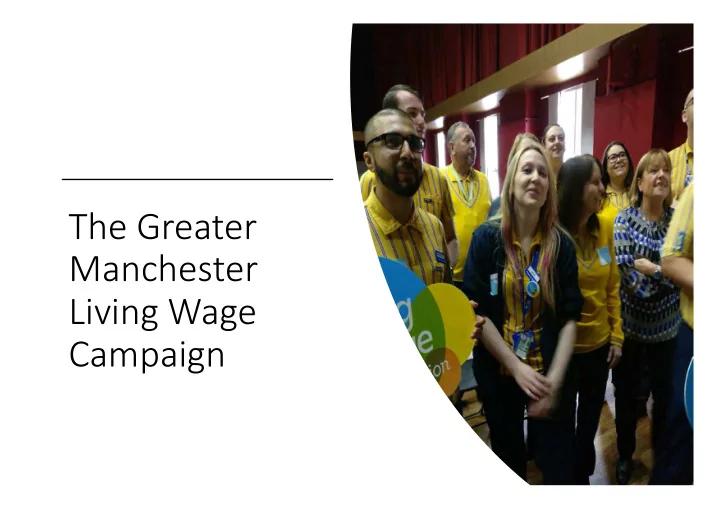

The Greater Manchester Living Wage Campaign
What is the Living Wage? h7ps:// www.livingwage.org.uk/ • Only the real Living Wage is independently calculated, each year, based on what employees and their families need to live • Employers choose to pay the real Living Wage on a voluntary basis • The rates apply to all workers over 18, in recogni@on that young people face the same living costs as everyone else • Paying a wage that is enough to live on is good for business, good for the individual and good for society .
The Greater Manchester Workforce • 2.73 million people live in Greater Manchester (GM) • There are 1.17 million households in GM • 1.4 million people are working in around 105,000 businesses • GM has the largest travel to work area in any conurba@on in the UK outside of London with 7 million people living within one hours drive of the city centre
In-Work Poverty in Greater Manchester Across the UK some 5.2 • million people are paid less than the real Living Wage (KPMG 2013) • An es@mated 12.3% of GM employees are paid less than the real LW & 1 in 6 working households receive financial support through Tax Credits to top up their wages (GM Poverty Commission) • The low pay/no pay cycle once in, is very hard to get out of (Shildrick for JRF 2010) & Resolu@on Founda@on 2013).
Parents in Poverty in Greater Manchester Work by the Employment Research Ins@tute at Napier University and published by the Joseph Rowntree Founda@on found that: Reasons for households moving into • poverty were: birth of a child, rela@onship breakdown and job loss Obtaining a low paid job did not • improve their financial situa@on enough Staying in the low pay/no pay cycle • was effected by types of work available, debt, lack of affordable and suitable child care, difficult to access educa@on and the opera@on and monetary levels of benefits and tax credits The researchers found that for parent • to escape poverty and the low pay/no pay cycle, paid employment must improve their financial circumstances, increase their ability to fulfil care responsibili@es including for older people.
Children in Poverty in Greater Manchester The Ins@tute of Fiscal Studies, funded by Joseph Rowntree Founda@on, found that: • Between 2009 and 2014, employment rose so more children were living with in- work parents • At the same @me, child poverty rose from 54% to 63%.
Methodist Church Research • Before the Methodist Church adopted the real Living Wage, its internal research showed that many of their low paid employees worked as part @me cleaners, office workers, gardeners and caretakers • It is assumed the same will be true in other denomina@ons.
How Much Does it Cost to Pay the Living Wage? • In 2012, the Diocese of Sheffield es@mated that the cost would be £3,600 a year • Other research, by the Methodist Church, showed that the cost can be rela@vely low, affec@ng only 1 in 6 churches
Business Case for Paying the Living Wage • People are happier at work; they are more mo@vated; there is less staff turnover; there is less absenteeism and produc@vity is increased • The Ins@tute of Fiscal Studies es@mates that not paying the Living Wage amounts to £6 billion a year in benefits and forgone revenue.
How to Become a Living wage Employer • The Living Wage Founda6on provide: • Advice and • Support on How to become an accredited Living Wage Employer. For more informa@on please visit: h8ps:// www.livingwage.org.uk/
SupporLng the Greater Manchester Living Wage Campaign • Join the GM LW Campaign Group • Subscribe to the GMLW Campaign Newsleher • Get to know more about the GM Good Employment Charter • The following ar@cle produced by the Inclusive Growth Analysis Unit, Oxfam and GM Poverty Ac@on provides a comprehensive introduc@on to employment charters: • hhp:// hummedia.manchester.ac.uk/ ins@tutes/mui/igau/briefings/ IGAU-Briefing-2-Employment- Charters.pdf
Living Wage Week • Monday the 6 th of November. The Living Wage Founda@on will announce the new Living Wage rate. • Join us at our Breakfast Mee@ngs, during the rest of the week, where we will be running community engagement events, and asking key ques@ons, about all aspects rela@ng to the crea@on of a GM Good Employment Charter.
Become A Living Wage Champion 1. Write to local employers 2. Use social media 3. Write to the local paper 4. Speak to employers in person 5. Use calling cards 6. Give a talk More informa@on available at h8ps:// www.livingwage.org.uk/
Please Get in Touch Dr Lynn Sbaih Coordinator Greater Manchester Living Wage Campaign Lynn.sbaih@gmliving wage.org 07948 549485
Recommend
More recommend